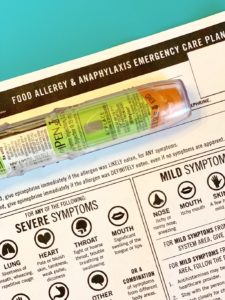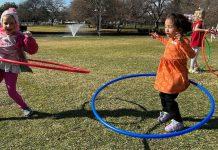Peanut butter Cheerios changed my life.
I don’t mean in an awesome “wow, these are so good!” kind of way. I mean in a life-altering, scary kind of way. You see, like many moms of a ten-month-old, I was trying to keep my hungry baby happy. So I gave him a handful of the first thing I saw in the pantry— a box of peanut butter Cheerios. Ten minutes later, my son was covered in hives, his eyes watering, his face red. Thankfully, he only had a few and we were spared a trip to the emergency room. A few months later, he was officially diagnosed with a peanut allergy.
 It’s now been over a year. Since then, I’ve asked our allergist no fewer than 5 billion questions, moving from near total ignorance to sobering knowledge about one of the most severe food allergies. We’re cautious with new foods, checking labels compulsively. Peanut products are strictly monitored in our house. I know how to use an EpiPen and pray that I never have to.
It’s now been over a year. Since then, I’ve asked our allergist no fewer than 5 billion questions, moving from near total ignorance to sobering knowledge about one of the most severe food allergies. We’re cautious with new foods, checking labels compulsively. Peanut products are strictly monitored in our house. I know how to use an EpiPen and pray that I never have to.
A peanut, shellfish, tree nut, dairy, egg, or soy allergy are not to be taken lightly. I think most parents know this, but if you’ve never walked down this road with your own child, it can be difficult to wade through the misinformation and ignorance that often surround food allergies.
Parents of children with a food allergies need you to know that:
- A food allergy is a very real, potentially deadly condition where our child’s immune system has a negative reaction to certain foods. A food allergy is NOT the same as a food sensitivity or intolerance, neither of which involve the immune system. In other words, food allergies are not a preference or dietary choice we’ve made for our kids; a lot of us never saw it coming, this horrible knowledge that the wrong bite of food can be life-threatening.
- We live with these food allergies every minute of every day. Every day I have to triple-check labels, ask the obnoxious questions at the restaurant, make sure no one gives my son a bite of a granola bar with peanuts. And as he gets older, I will have to teach him to monitor these things for himself. And food allergies cannot be cured. My son has about a 20% percent chance of outgrowing his peanut allergy. More than likely, he will be dealing with it for his entire life.
- Food allergies can be incredibly isolating, especially at social events which tend to center around food. No kid likes to feel like she is different from her peers or being left out, and if she can’t have the treat everyone else is eating, that can be hard. Birthday parties are difficult; Halloween can be agony. To the best of your ability, please include our children. And I don’t mean baking an entirely allergen-free recipe; non-food items are great too.
- Teaching your children about food allergies can minimize our children being made fun of or ostracized because they can’t eat pizza or a Reese’s. Compassion and understanding go a long way.
- Reading labels isn’t always enough. If you’re in doubt, ask us. We’re happy to answer any questions.
- Allergic reactions to food can vary in severity, ranging from an outbreak of hives to anaphylactic shock. What causes the allergic reaction can also vary, ranging from direct contact (eating the food), cross-contact (eating other foods contaminated by the allergen), and inhalation (breathing in dust or aerosols that contain the allergen). It’s important that friends, caregivers, and family members can recognize the signs and symptoms of an allergic reaction and take appropriate action.
- Sometimes sharing food is more harmful than kind. Teach your child not to share his or her food without an adult’s permission, especially when they’re young.
- While it may at times be inconvenient or annoying that your child is in a nut-free classroom, we really appreciate you refraining from packing the occasional peanut butter and jelly sandwich or hummus with pine nuts.
- Food allergies are life-altering, but they don’t define our children or us as parents. We’re simply moms and dads with a different set of challenges. Our kids are still kids.
- Most of us try not to dwell in the fear of a severe allergic reaction, and neither should you. We simply need the people around our precious children to be aware and informed.
Parents of children with food allergies aren’t trying to being high-maintenance or annoying. We’re just trying to keep our kids healthy and alive, and we are thankful for those who graciously and compassionately make each day of living with food allergies a little easier.













